

Smart cities mean rivalry in power, construction.
TECHNOLOGY: An author's take on renewable energy and the end of capitalism. Advertisement Jeremy Rifkin is the author of 23 books about the economy and technology, including his latest, "The Zero Marginal Cost Society.
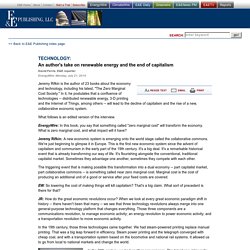
" In it, he postulates that a confluence of technologies -- distributed renewable energy, 3-D printing and the Internet of Things, among others -- will lead to the decline of capitalism and the rise of a new, collaborative economic system. What follows is an edited version of the interview. EnergyWire: In this book, you say that something called "zero marginal cost" will transform the economy. What is zero marginal cost, and what impact will it have? Jeremy Rifkin: A new economic system is emerging onto the world stage called the collaborative commons.
The triggering event that is making possible this transformation into a dual economy -- part capitalist market, part collaborative commons -- is something called near zero marginal cost. It’s time to consider bioregional self-sufficiency. Excerpted from James Quilligan in the ever excellent Kosmos journal: “For more than two centuries, laissez-faire economics has promoted the idea that free trade leads to democracy and prosperity.
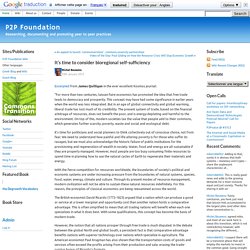
This concept may have had some significance in earlier years when the world was less integrated. But in an age of global connectivity and global warming, liberal trade has lost much of its credibility. An intentional egalitarian community as a small-scale implementation of postcapitalist, peer production model of economy. Part I : Work as a spontanous, voluntary contribution. In this article, I will present egalitarian communities, mainly Acorn community in Virginia, to examine whether the postcapitalist mode of production in the physical world can be introduced by establishing intentional communities.
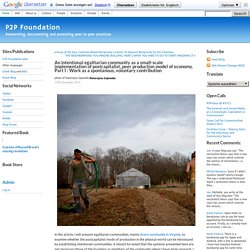
It should be noted that the opinions presented here are not necessary those of the founders or members of the community where I have done research. I interpret my findings with regard to their significance for this economic change and their reflection on the postcapitalist mode of production. Acorn community does not define itself as a peer production project so the following analysis is not an evaluation of the implementation of peer production theory into practice. It is instead an extrapolation from the practice to how peer production organizations in the physical world could operate in the current system and in the future. New Film Documents Commons-Based Peer Production in Greece. As one of the countries hardest hit by austerity politics, Greece is also in the vanguard of experimentation to find ways beyond the crisis.
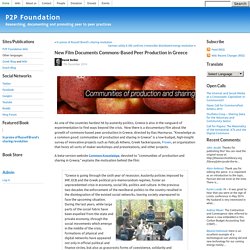
Now there is a documentary film about the growth of commons-based peer production in Greece, directed by Ilias Marmaras. “Knowledge as a common good: communities of production and sharing in Greece” is a low-budget, high-insight survey of innovative projects such as FabLab Athens, Greek hackerspaces, Frown, an organization that hosts all sorts of maker workshops and presentations, and other projects. How to start P2P projects and business models. If the model that underlies the P2P mode of production has caught your eye, we offer you a simple guide to get a project started.
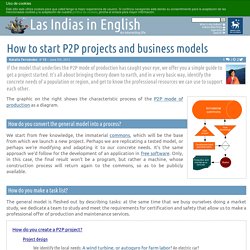
It’s all about bringing theory down to earth, and in a very basic way, identify the concrete needs of a population or region, and get to know the professional resources we can use to support each other. The graphic on the right shows the characteristic process of the P2P mode of production as a diagram. How do you convert the general model into a process? We start from free knowledge, the immaterial commons, which will be the base from which we launch a new project. Perhaps we are replicating a tested model, or perhaps we’re modifying and adapting it to our concrete needs. How do you make a task list? How do you create a P2P project? Economies of the commons. The past 10 years have seen the rise of a variety of on-line public domain and open access information, knowledge and media resources attracting millions of users, sometimes on a daily basis.
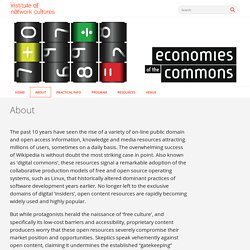
The overwhelming success of Wikipedia is without doubt the most striking case in point. Also known as ‘digital commons’, these resources signal a remarkable adoption of the collaborative production models of free and open source operating systems, such as Linux, that historically altered dominant practices of software development years earlier. No longer left to the exclusive domains of digital ‘insiders’, open content resources are rapidly becoming widely used and highly popular. But while protagonists herald the naissance of ‘free culture’, and specifically its low-cost barriers and accessibility, proprietary content producers worry that these open resources severely compromise their market position and opportunities. [vimeo] "The Interests of the Commons": Eric Lowitt on the Collaboration Economy. In this recent interview, guest editor Adam Werbach talks with Eric Lowitt, author of the forthcoming book, The Collaboration Economy (Wiley, April 2013).
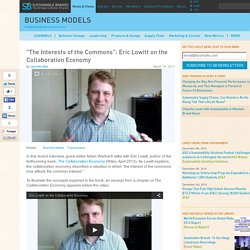
As Lowitt explains, the collaboration economy describes a situation in which “the interest of the commons now affects the common interest.” To illustrate the concepts explored in the book, an excerpt from a chapter of The Collaboration Economy appears below the video. The following is a modified excerpt of a chapter from the forthcoming book, The Collaboration Economy, by Eric Lowitt. The collaboration economy equips leaders of the private, public and civil sectors to collaborate in a way that both addresses vexing global challenges and kick starts inclusive global growth.
Are the following headlines indicative of actions that are acceptable to you? Commercial shipowners are finally working on making ship dismantling socially and environmentally safe. Beyond Jeremy Rifkin: How Will the Phase Transition to a Commons Economy Actually Occur? In his new book, Jeremy Rifkin focuses on the value crisis of contemporary capitalism based on the revolution in marginal costs which destroys the profit rate.
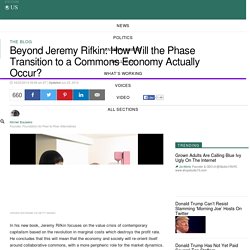
He concludes that this will mean that the economy and society will re-orient itself around collaborative commons, with a more peripheric role for the market dynamics. In this, Jeremy Rifkin joins the founding charter of the P2P Foundation, which was precisely created in 2005 to observe, study and promote this transition. Past historical phase transitions, say the transition from the Roman Empire slave-based system to feudal serfdom, or the transition of feudalism to capitalism, where not exactly smooth affairs, so it may be un-realistic to expect a smooth and unproblematic phase transition towards a post-capitalist social order.
To get a better understanding of how this transition could occur, we can do two things. 1. The transition dynamic can be summarized as: 2. Why the solar commons. Concerns and Solutions As the US Congress prepares to pass historic legislation that moves us towards a clean energy economy, the need arises for diverse business models to capture the wealth of the emergent green economy.
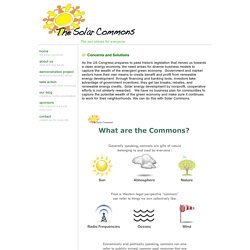
Government and market sectors have their own means to create benefit and profit from renewable energy development: through financing and banking tools, investors take advantage of government incentives: they get tax breaks, rebates, and renewable energy credits. Solar energy development by nonprofit, cooperative efforts is not similarly rewarded. We have no business plan for communities to capture the potential wealth of the green economy and make sure it continues to work for their neighborhoods. We can do this with Solar Commons. Using right of way and trusts, the Solar Commons Project began to build an alternative business model that creates a niche in the green economy for a commons-based approach to renewable energy development. From Open Business Models To An Economy Of The Commons. What does it take for open business models to become an economy of the Commons?
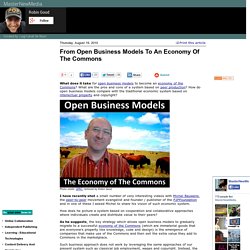
What are the pros and cons of a system based on peer production? How do open business models compare with the traditional economic system based on intellectual property and copyright? Photo credit: GPRC, remixed by Robin Good I have recently shot a small number of very interesting videos with Michel Bauwens, the peer-to-peer movement evangelist and founder / publisher of the P2PFoundation and in one of these I asked Michel to share his vision of such economic system.
How does he picture a system based on cooperation and collaborative approaches where individuals create and distribute value to their peers? Such business approach does not work by leveraging the same approaches of our present system such as classical job employment, wages and copyright. Here is the full video interview (with a full text transcription): Define the Commons - Michel Bauwens, Thailand / Belgium. P2P Politics: The Grand Coalition Of Commons - Michel Bauwens. An introduction to participatory and contributions-based peer production - Michel Bauwens. Degrowth 2014 - Michel Bauwens on The Transition to a Sustainable Commons Society. Community and the Commons - Michel Bauwens. 2. The English Enclosures. 1. Tragedy of the Commons. The Tragedy of the Commons Explained. Tragedy of The Commons. On the Commons. On The Commons. This U.S. organization promotes the Commons in all its form. On the Commons serves as a commons movement strategy center, connecting organizations, community leaders and individuals with new ideas, practical solutions and each other to create change.
URL = OTC has a strongly recommended blog. You can subscribe to various feeds here: "On the Commons is a network of citizens and organizations exploring new ways to achieve social justice, environmental harmony and democratic participation at all levels of society. Marcellus Andrews—New York, NY Harriet Barlow—Blue Mountain Lake, NY Maude Barlow—Ottawa, Ontario Peter Barnes—Point Reyes, California Elizabeth Barnet—Inverness, California David Bollier—Amherst, MA Jim Boyce—Amherst, MA Alexa Bradley—Boston, MA Rachel Breen—Minneapolis, MN Chuck Collins—Boston, MA Chris Desser- San Francisco, CA Mark Dowie—Point Reyes, CA Kim Klein—Oakland, CA Brad Lichtenstein—Milwaukee, WI David Mann—Minneapolis, MN Ana Micka—St.
Working together to bring the principles and practices of the commons to the world. Plenty More Fish in the Sea? Discards in the EU (Common Fisheries Policy) The Common Fisheries Policy (CFP) - Fisheries. Management of EU fisheries What is the Common Fisheries Policy? The CFP is a set of rules for managing European fishing fleets and for conserving fish stocks. Designed to manage a common resource, it gives all European fishing fleets equal access to EU waters and fishing grounds and allows fishermen to compete fairly. Stocks may be renewable, but they are finite. Some of these fishing stocks, however, are being overfished. Richard Swift on the Emergence of a New Horizontal Commons Democracy. Excerpted from S.O.S: Alternatives to Capitalism by Richard Swift, Between the Lines, 2014 Richard Swift: “Other commons-based movements, striving for an alternative ethos, are just getting started.
Attempts to create a horizontal commons democracy include the Right to the City movement and other urban initiatives inspired by the French libertarian Marxist Henri Lefebvre. Contra Rifkin (2): no, the commons are not anti-market. Excerpted from Eric Raymond: “Perhaps the most serious error, ultimately, is the way Rifkin abuses the notion of “the commons”. This has a lot of personal weight for me, because I have lived in and helped construct a hacker culture that maintains a huge software commons and continually pushes for open, non-proprietary infrastructure. I have experienced, recorded, and in some ways helped create the elaborate network of manifestos, practices, expectations, how-to documents, institutions, and folk stories that sustains this commons. I think I can fairly claim to have made the case for open infrastructure as forcefully and effectively as anyone who has ever tried to.
Governing The Commons: The Evolution of Institutions for Collective Action. Definitions The commons is a general term for shared resources in which each stakeholder has an equal interest. Studies on the commons include the information commons with issues about public knowledge, the public domain, open science, and the free exchange of ideas -- all issues at the core of a direct democracy. Common-pool resources (CPRs) are natural or human-made resources where one person's use subtracts from another's use and where it is often necessary, but difficult and costly, to exclude other users outside the group from using the resource.. PART THREE: THE HYPOTHETICAL MODEL OF MATURE PEER PRODUCTION: TOWARDS A COMMONS-ORIENTED ECONOMY AND SOCIETY. This entry is about "Network Society and Future Scenarios for a Collaborative Economy" co-authored by Vasilis Kostakis and Michel Bauwens. The scholarly book is published by Palgrave Macmillan and here you may find a working draft of it: The discussion about is continuing on the P2P Foundation mailing list, the Networked Labour mailing list and in personal email exchanges at kostakis.b AT gmail.com and/or michel AT p2pfoundation.net.
Governing The Commons: The Evolution of Institutions for Collective Action. Governing the Commons. FLOK Society (EN) The FLOK Society Project: Making The Good Life Possible Through Good Knowledge.